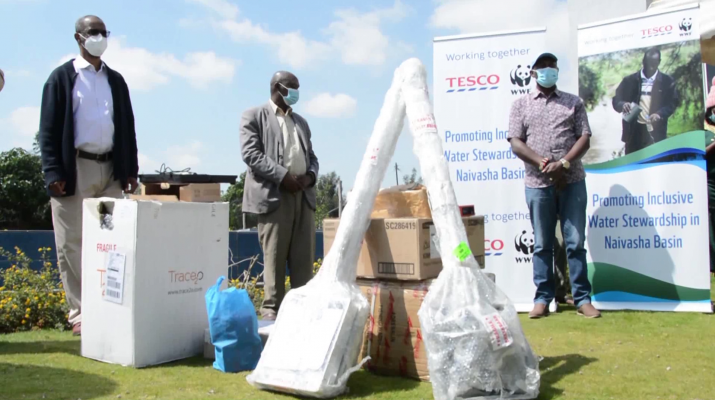Stakeholders around Lake Naivasha have expressed their concern over massive pollution of rivers in the catchment area from upcoming industries.
They have noted that heavy metals from the milk, timber and food processing companies were finding their way into the troubled lake.
This came as it emerged that the rising number of infrastructure projects in Naivasha posed a major challenge to the water-scarce basin.
This emerged when WWF-Kenya and UK based TESCO supermarket donated water monitoring equipment to members of Lake Naivasha Basin Water Resources Users Association (WRUA).
According to the chairman Lake Naivasha Water Resource Users Association (LANAWRUA) Enock Kiminta, the monitoring kit would come in handy in their operations.
He noted that initial studies indicated that the upcoming industries in Nyandarua County were polluting rivers in the catchment area.
“We have seen an upsurge in the number of food processing factories in the catchment which are emitting heavy metals into the rivers,” he said.
Kiminta at the same time noted that water levels in the lake and the rivers had dropped sharply due to failed rains.
“Water levels in Lake Naivasha are dropping at an alarming rate due to the current harsh weather while some of the rivers in the catchment area have dried up,” he said.
WWF Country-Director Mohammed Awer noted the population in Nakuru had risen by four times leading to an increase in water demand.
Awer noted that this had put pressure on River Malewa which was the main source of water thus the need to manage the available resources.
“The water monitoring equipment that we have donated to the 12 WRUAs will help us get data on the amount of available water for planning purposes,” he said.
He admitted that the upcoming infrastructure projects that included the SGR and the Industrial park would have effects on the amount of water in the region.
“We have to monitor the available water in the basin to avoid a repeat of the situation we had in 2008 when water levels in Lake Naivasha receded by over 9m,” he said.
On his part, Dr William Ojwang from WWF said that the monitoring kit would assist in collecting data on the quality and quantity of water from the basin.
He noted that Lake Naivasha basin faced water scarcity adding that the upcoming infrastructure projects would have effects in the region.
“As demand for water rises, we have decided to engage the farmers so that we can know the amount of water abstracted and its quality,” he said.

